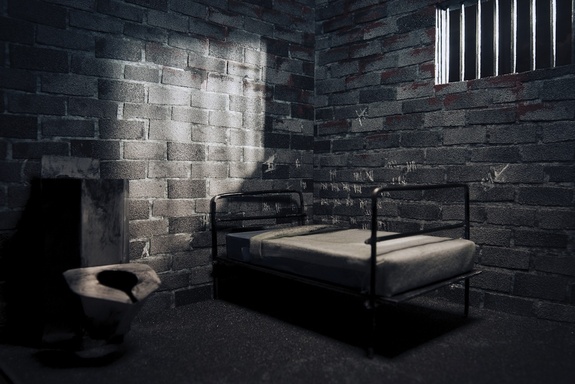Massive Rise in Prison Population May Have Serious Consequences

VANCOUVER, British Columbia — More people are now imprisoned in the United States than ever before — a trend that may have damaging consequences both for prisoners and for the nation as a whole, experts said Saturday (Feb. 18) here at the annual meeting of the American Association for the Advancement of Science.
In 1980, there were fewer than 2 million people in prison, in jail (awaiting trial or convicted of minor crimes), on parole or on probation in the United States. By 2010, that number had swelled to over 7 million people.
Currently, the roughly 2.4 million people in prison or on parole account for about 1 percent of the U.S. voting age population, while 2.4 percent of adults are ex-prisoners (about 8.1 million people in 2010), said University of Minnesotasociologist Christopher Uggen.
The same number of people — 700,000 — are released from prison every year as the number of men who graduate from college with bachelor's degrees every year, something that suggests "the rise of the penal state has broad social implications," said sociologist Michael Massogliaof Pennsylvania State University. [10 Contested Death Penalty Cases]
Racial differences
While the percentage of the population in prison has remained relatively static in some countries, such as Japan, "the U.S. has proceeded to make a series of choices that has resulted in the situation described today," Uggen said.
The picture is even direr for African-Americans.
Get the world’s most fascinating discoveries delivered straight to your inbox.
About 3.1 percent of the adult African-American population is in prison or on parole, and 7.4 percent of African-American adults are ex-prisoners.
"Incarnation has not only grown dramatically, but it's disproportionally concentrated among certain subgroups of the population," said sociologist Becky Pettitof the University of Washington in Seattle. "Criminal justice contact has become normative among some sociodemographic groups, particularly among low-educated African-American men. Incarnation has become a repository for the most disadvantaged segments of the population."
Consequences narrow and broad
Research shows that the status of ex-criminal makes it harder to find a job, to support a family, to vote and even to stay healthy. They are often restricted from living in certain types of public housing, and from working in certain types of jobs.
"The choices that ex-inmates have are limited," Massogliasaid. "We know that ex-inmates have fewer financial resources and social ties."
And the effects aren't just felt on the individual level, but on society as a whole, the scientists said.
For example, many studies, such as the widely used Current Population Survey carried out by the U.S. Bureau of Labor Statistics and the Census Bureau, count only people living in households, and exclude people living in jail. These studies sometimes lead to overly optimistic assessments of racial progress, Pettit said.
"Using data from the Current Population Survey between 1980 and 2008, you see a decline in the racial gap in high-school dropout rates," Pettit said."But if you include inmates, what you see is no improvement in racial inequality in the high-school dropout rates since 1991."
Election results
The same problem affected widely touted estimates of voter turnout in the last presidential election.
"After the 2008 election, more than one headline indicated there was incredibly high voter turnout rates among young African-American men," Pettit said. "If we adjust for the number of people incarnated, the voter turnout was exactly the same as in the 1980 Reagan-Carter election."
And because many states deny people who have been convicted of a felony the right to vote, either temporarily or permanently, about 5.3 million Americans are disenfranchised.
This disparity has led to different outcomes in at least two presidential elections — the 2000 Bush vs. Gore fight and the 1960 election of John F. Kennedy over Richard Nixon — which studies suggest would have been different if those ex-cons had been able to vote, Massogliasaid.
Ultimately, the experts said that mandatory minimum sentencing, especially for drug crimes, as well as the length of probation periods, could be reevaluated to reduce the huge prison population.
"Incarceration is a very inefficient and blunt tool to restrict crime," Uggen said. "We're incarnating many people who are no longer dangerous. It's much more about retribution and punishment than rational policy."
However, the recent recession may be causing some lawmakers to reevaluate prison policy in light of the fact that it can cost about $140,000 a year to keep just one inmate in prison, he added.
You can follow LiveScience senior writer Clara Moskowitz on Twitter @ClaraMoskowitz. For more science news, follow LiveScience on twitter @livescience.



